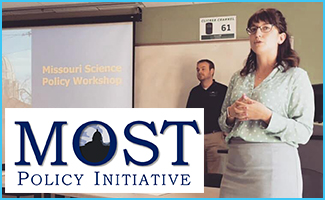
When faced with a difficult decision, it is crucial to understand and research all aspects of the issue. Only with all the available information can the appropriate action be taken. Imagine being in a position where you must make a quick decision on issues you know nothing about. This is the reality for state legislators in Missouri and across the country.
Rachel Owen, PhD, Executive Director of the Missouri Science and Technology (MOST) Policy Fellowship Program, found a great opportunity that served a larger need. She aims to create access for Missouri State Legislators to science and technology fellows in Jefferson City. With only 20% of the state’s 197 legislators having STEM degrees and nearly 2,000 bills being introduced each year, the state of Missouri is a perfect fit for this type of fellowship to have an immediate and substantial impact on policy issues.
The MOST Policy Fellowship Program, started in 2016, is loosely based on a national Association for the Advancement of Science (AAAS) program. They have been creating a career path for PhD scientists to work on the staff of the congressional or the executive branch committees for nearly 40 years. Until recently, however, the program has not extended beyond Washington D.C. The state of California was the first state to create a fellowship program, and Missouri has the goal of being the fourth. “It’s really exciting to be setting a nationwide example as being one of the leaders in this area,” Owen said.
Using the AAAS and California state model, Owens has been identifying funds and gathering support in Jefferson City. In the spring of 2019, the James S. McDonnell Foundation in St. Louis offered a grant for a feasibility study. This allowed Owens to work full-time to establish a long-term sustainable financial plan for the program. Owens will start taking applications for the MOST Policy Fellowship Program in January 2020.
“I think nationwide we would all agree that if legislators had the information, they can make better evidence-based policy decisions at both a state and federal level,” Owen said. “We really want our leaders to be able to have evidence and be able to include relevant science as a part of their decisions in Jefferson City.”
This resource for legislators will impact agricultural and natural resource science, life sciences, engineering, public health, social sciences, and bring a diverse background that would reinforce the science notes on bills with relevant scientific information. This provides the opportunity for better researched decisions at the pace that policy needs to operate.
Owen currently operates out of the University of Missouri in Columbia. Originally from Ankeny, Iowa, she recognized her scientific calling early on. “I remember my eighth-grade science teacher always really encouraged me to become a scientist,” Owen said. She started down the pre-med path but took an elective “Earth Science” class and fell in love with soil science. “It was a class that I never heard of or thought to pursue, but I really enjoyed working on a resource that is so important to people around the world,” Owen said.
For nearly 200 legislators in Jefferson City, there is a lot of scientific responsibility in every general assembly. The agricultural center in North Central Missouri, timber production in the Ozark region, and the Manhattan, Kansas to Columbia, Missouri corridor that is known worldwide for animal health and nutrition companies, state legislators have an immediate potential to foster growth in the sector. Without proper support in the science, technology, engineering, and mathematics fields it is difficult to make informed, impactful policies that will shape the region’s future. For Owen and the MOST Policy Fellowship Program, the win-win is to keep talented researchers in the area while providing resources for lawmakers who want to inspire growth in their districts.
Owen studied to make a global difference, and her current path isn’t that much different. By properly fertilizing and cultivating thought and research among legislators in Jefferson City, she is nurturing different regional scientific policies to grow. The MOST Policy Fellowship concept will help the state of Missouri provide the resources required to make good decisions quickly, with a more complete scientific understanding. The benefits of this program are significant and will allow Missouri to not only maintain, but also advance its standing as a leader in research and development, agricultural and environmental management, and health care.
To learn more about the MOST Policy Fellowship or to support the program, click here.